They Fled War to Find a Brighter Future. Now, This Power Couple is Using Their Success and Influence to Give Back.
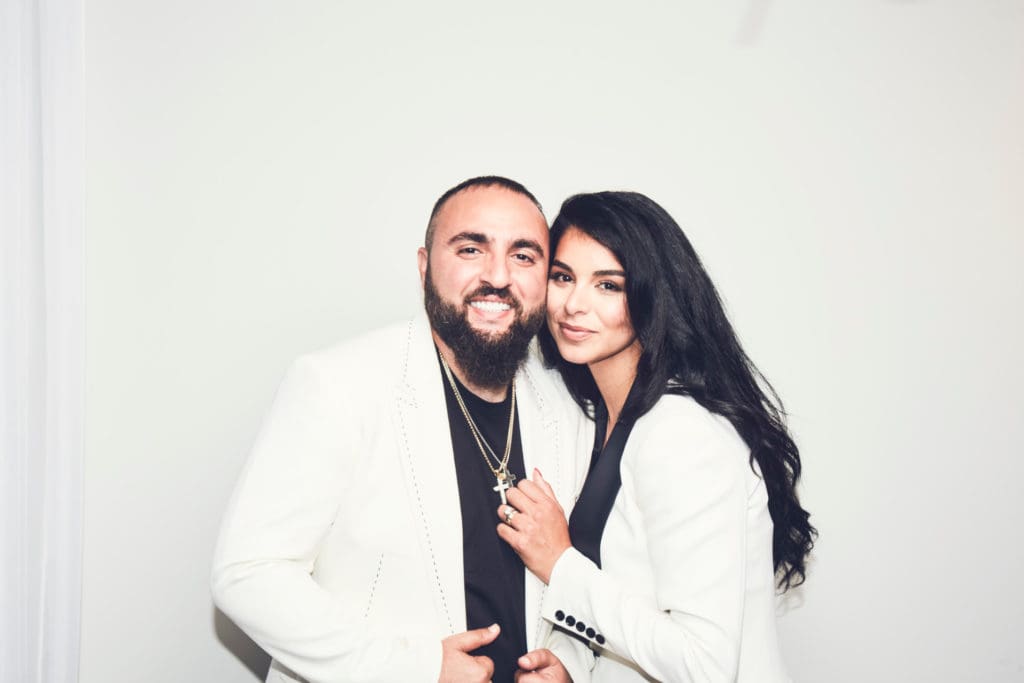
Rima and Sal Slaiby are the definition of a power couple. She was the first Arab and immigrant woman to be crowned Miss USA and is now an avid philanthropist. Sal is a record-label CEO of XO Records, and currently manages music superstars The Weeknd, Bebe Rexha, French Montana and more. They’ve reached the pinnacle of success and have more opportunities than they’d ever imagined.
But their lives didn’t always look this way. Both Sal and Rima are refugees. They were forced to flee their home country of Lebanon when war became too much to bear and start over in a completely different culture and place. Their experience with struggle has shaped their lives, creating an unyielding commitment to giving back. And they have a special place in their hearts for Lebanon, the land where they were born and raised.
As the COVID-19 crisis progresses and threatens to double the number of hungry people worldwide, Sal and Rima wanted to do more to meet the rising need in their homeland. They decided to set up a fundraiser for World Food Program USA (WFP USA) to help provide food and lifesaving supplies to struggling families in Lebanon. The fundraiser was an overwhelming success; it raised more than $100,000 in 24 hours to help people there in need.
We wanted to know more about Sal and Rima’s journey, and why – even surrounded by success – they continue to remember people who don’t have enough. Graciously, the couple agreed to answer a few questions and tell us more.
World Food Program USA: We know you didn’t just set up a fundraiser, you donated through it too. What motivated you two to give back during this time?
Sal + Rima: We have always been involved in humanitarian work. At this time, our biggest motivation was the fact that our native country profoundly needed us, and we are so proud to help in any capacity.
World Food Program USA: Could you tell us more about your background? You’re both Lebanese refugees, who fled war in Lebanon for Canada and the U.S. Do you remember what life was like in Lebanon during this time?
Sal + Rima: Life in war torn Lebanon was really tough. Escaping was the only option. We have huge gratitude to Canada and USA for adopting us during those rough times. Both of us love to visit our beautiful native country, Lebanon, during the summer and Christmas. Lebanese culture is so special in how it honors family, has the best food, and incredible celebrations.
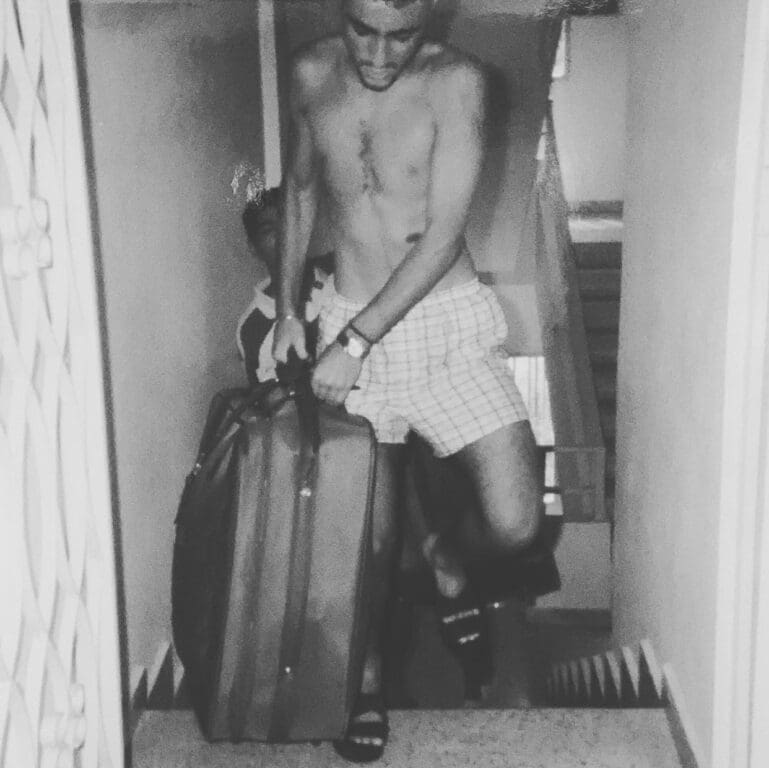
Sal escaping Lebanon at the age of 15.
World Food Program USA: Did you ever experience hunger? What did that feel like?
Sal + Rima: We thank our parents for always working so hard and making sure that there was food on the table.
Sal: For me, a strong memory was when my father and uncles would gather to go fight to get bread to bring home. It was like fighting for your life. We used to cheer for them when they would come back. It was heartbreaking and it shaped me into a stronger young man.
World Food Program USA: What led to you leaving Lebanon? And what were your journeys to the U.S. and Canada like? Sal, in a recent speech you gave, you mentioned that when you entered Canada, you started to dream of the future, which was exciting because that’s not something people did in Lebanon. Can you explain this a little more?
Rima: War got tougher and tougher day by day. I thank God for my father who struggled to get us visas and helped us escape to New York City in hope of giving us a home and education.
Sal: I couldn’t take living underground anymore, hiding from the war and bombs. Thank GOD my mom helped me escape to find myself a better future – and at that time Canada was accepting immigrants.
Entering Canada all on my own at the age of 15 was young enough to start a new beginning. I didn’t speak English and I had no relatives or support system, but I had safety and from that I built my future and became the man I am today.
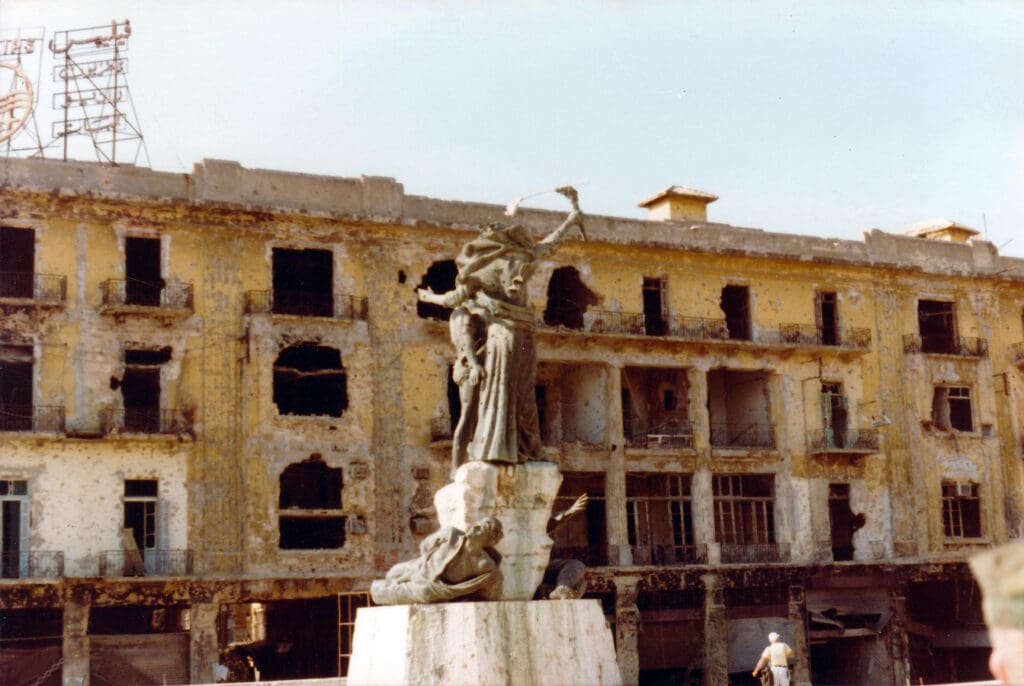
Destruction in the Lebanese capital of Beirut during its civil war.
World Food Program USA: What was it like being a refugee in a place completely different than where you grew up? How did you cope and adjust? Were there any people or organizations that helped you along the way?
Rima: I spoke no English and I thank the ESL program at school and welfare social services that provided me with what I needed at the age of only 7.
Sal: The streets taught me the English language and the path to my future life. I was lucky enough to have the drive to enroll myself in school and then later in college. My escape from Lebanon to Canada built something inside of me that made me strong and ready to face any challenges that life brings.
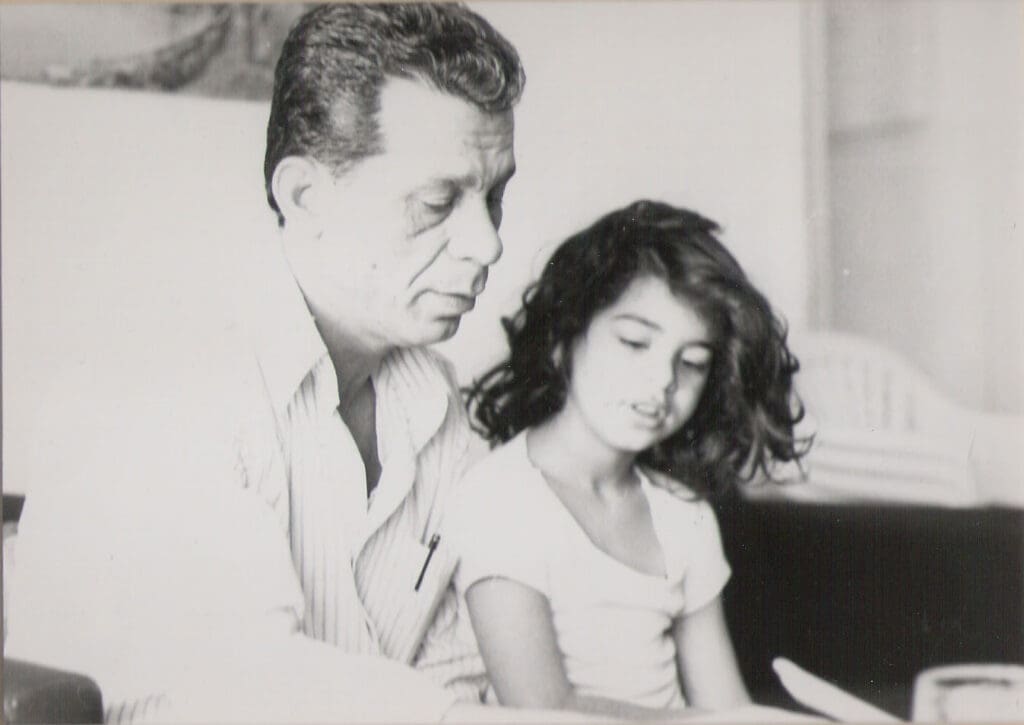
Rima and her father learning English after immigrating to NYC.
World Food Program USA: How did you meet? I know Rima lived in the U.S., and Sal, you were initially in Canada.
Sal + Rima: We met at Puff Daddy’s pajama birthday party for family and friends that was held at his home. We were the only two who showed up with no pajamas. It truly felt like love at first sight. We talked all night for hours realizing that we shared so much of the same struggle and life experiences.
World Food Program USA: You’ve both become incredibly successful. Rima – you were the first Arab woman to win the title of Miss USA in 2010, and you’re now a producer and avid philanthropist. Did winning Miss USA influence the trajectory of your charity work at all? Or what influenced your giving spirit?
Rima: My giving spirit began long before winning Miss USA, when I realized that I was blessed with so many things and I truly wanted to pay it forward. In 2005, I joined AmeriCorps, where I helped translate applications for immigrants so they could file for Medicare or use job enrollment forms.
Miss USA gave me the crown to do more, and I am very thankful for that still today. I currently hold the title as Ambassador of the Children’s Cancer Center of Lebanon, board member of Best Buddies, and full-time volunteer with School on Wheels.

Rima crowned Miss USA, the first Arab and first immigrant to win the title.
World Food Program USA: And Sal, how did you get involved in the music business? How has your career evolved throughout the years?
Sal: I met my best friend and artist, Belly, about 20 years ago and he convinced me to get into the music business. We launched our first music company together with Belly and Massari as my first two artists. My career began around an old TV box we used as our master plan table – and with passion and no experience I brought myself to where I am in music today.
World Food Program USA: Do you feel that your experience as refugees contributed to your success? How has it impacted not only your careers, but your perspective of life and success?
Sal + Rima: Absolutely … building it from the ground up will only teach you the hard way, and it helps you build a strong foundation. You will always know what it takes, especially when nothing is given to you easily. You work to fight every day for what you want and have endless gratitude.
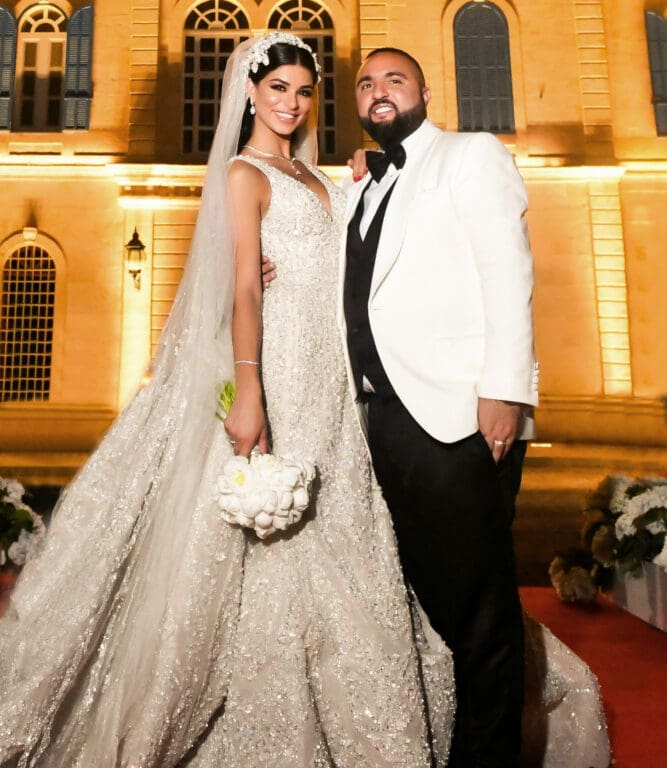
Sal and Rima on their wedding day in Bkerke, Lebanon
World Food Program USA: We certainly appreciate your passion for giving back. There are a lot of charities out there – why did you choose WFP as the recipient of this fundraiser?
Sal + Rima: After I read the article that 75 percent of Lebanon is in need of aid, we searched for the organization that helps hunger and immediately realized World Food Programme was the one. Thank you for having us do this together.
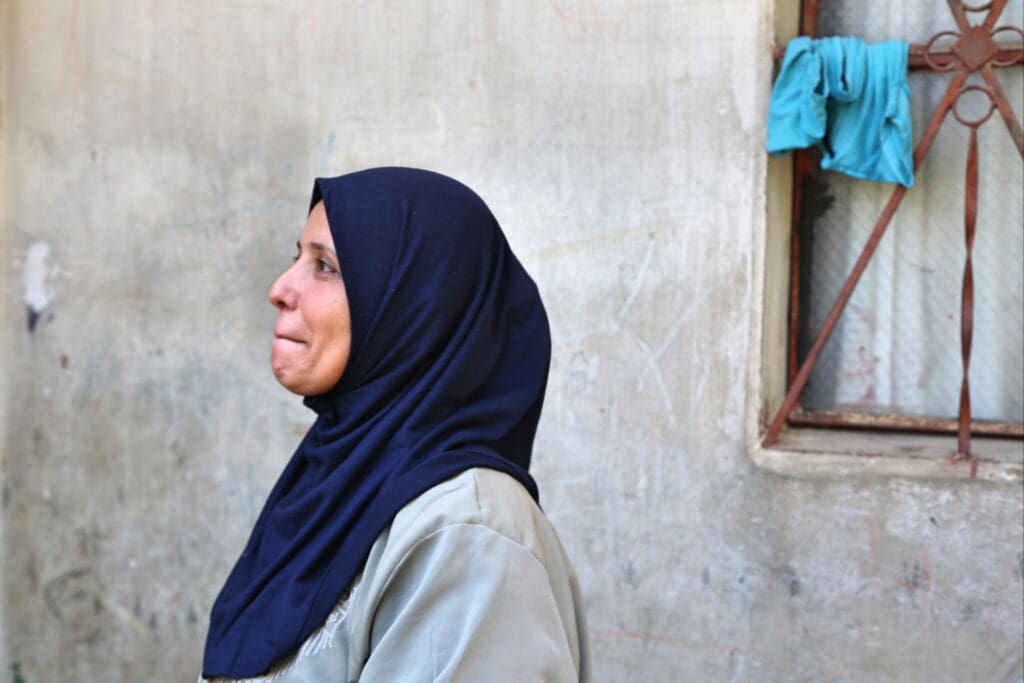
Montaha was born into a poor family and is now raising a poor family. She depends on WFP assistance to help feed her family and break the cycle.
World Food Program USA: Given the global pandemic, these are difficult times for a lot of people right now. You’ve both certainly lived through difficult times, so I’m wondering if you have any encouraging words of advice to help people get through this crisis? And why is it important to continue to give back, even with so much uncertainty around us?
Sal + Rima: Depend on yourself and never judge yourself for having nothing. Instead, just envision what you want and focus on the steps to get yourself there. Be strong always. Those who come from nothing are the ones who end up changing the world. For us giving back is the only way. We want our kids to grow up and know the importance of giving back.
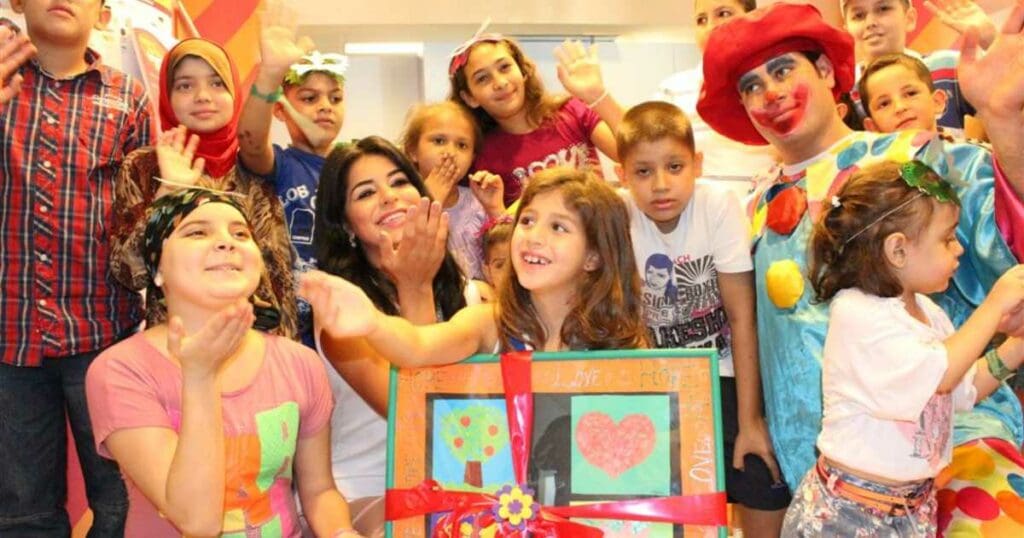
Rima volunteering with Children’s Cancer Center of Lebanon




